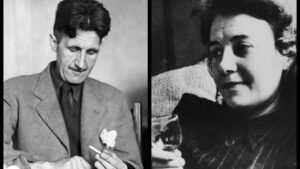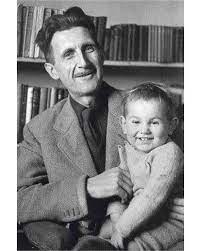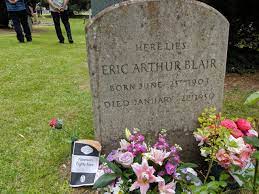BIOGRAPHY:
An ardent opponent of the Stalinist regime and communism, a defender of democratic socialism, who fought in the Second World War on the side of the USSR, this writer became one of the most controversial people of his time. Having staged a rebellion against the society he so strived for, he wrote about himself that he was a stranger in this world and time.
Childhood and youth:

Eric Arthur Blair (pen name George Orwell) was born in the city of Motihari (Bihar, India) on June 25, 1903. Eric’s father served as an official in the department that controlled the production and storage of opium. The biography is silent about the mother of the future writer. According to contemporaries, the boy grew up in an authoritarian family: as a child, he sympathized with a girl from a poor family, but the mother severely suppressed their communication, and the son did not dare to contradict her.
At the age of eight he entered an English school for boys, where he studied until he was 13 years old. At the age of 14, Eric won a personal scholarship, thanks to which he entered a private British school for boys – Eton College. After graduating from school, Eric Arthur joined the Myanmar (formerly Burma) police. Disillusioned with the political system of modern society, Blair went to Europe, where he lived off low-skilled jobs. Later, the writer will reflect this stage of his life in his works.
Literature:

Having discovered his literary talent, Blair moved to Paris and began writing books. There he published his first story, “Rough Pounds in Paris and London,” where he described his adventures while living in Europe. In Great Britain, the writer wandered, and in France he washed dishes in Parisian restaurants. The first version of the book was called “The Diary of a Dishwasher” and described the author’s life in France. However, the writer was rejected by the publishing house, after which he added London adventures to the book and turned to another publishing house, where he again encountered a refusal. Only on the third attempt did the publicist and publisher Victor Gollancz appreciate Blair’s work and accept the manuscript for publication. In 1933, the story was published, becoming the first work of the then unknown George Orwell. To the author’s surprise, critics reacted favorably to his work, but readers were in no hurry to purchase the already limited edition of the book.

Orwell researcher V. Nedoshivin noted that Orwell, disappointed with the social system, staged a personal rebellion following the example of Count Tolstoy. And in 1933, the writer himself said that he felt like a stranger in the modern world. Returning to England from Spain after being wounded, Orwell joined the ranks of the Independent Labor Party, which supported the development of socialism. At the same time, sharp criticism of the Stalinist totalitarian regime appeared in the writer’s worldview. At the same time, George releases his second work, the novel Days in Burma.
This is the first time the work has been published in the United States. This book also reflects a certain period of the author’s life, specifically his service in the police department. The author continued this theme in the stories “Execution by Hanging” and “How I Shot an Elephant.”
Orwell described participation in hostilities in Spain in the ranks of the Marxist party in his little-known story “In Memory of Catalonia.” During World War II, the writer stood on the side of the USSR, despite the rejection of the regime of Soviet leader I.V. Stalin. By the way, while criticizing the policies of the USSR in literary works and journalistic notes, Orwell himself never visited the Soviet Union in his entire life, and the British intelligence services even suspected him of political ties with the communists.
After the end of hostilities and the liberation of Europe from the Nazis, Orwell wrote the political satire Animal Farm. Researchers of George’s work view the basis of the story in two ways. On the one hand, taking into account the author’s worldview, literary scholars argue that Animal Farm exposes the events of the 1917 Revolution in Russia and the events that followed it. The story vividly and allegorically describes how the ideology of the ruling elite changes during the revolution.
On the other hand, after the Soviet victory in World War II, Orwell’s political views underwent a number of changes, and the story may reflect events in Great Britain. Despite the discrepancies among critics and researchers, the story was published in the Soviet Union only during perestroika.
The plot of “Animal Farm” was based on a situation that the writer once witnessed. In an English village, George saw a boy driving a horse with a rod. Then Orwell first had the idea that if animals had consciousness, they would have long ago gotten rid of the oppression of a much weaker person.
Five years later, George Orwell wrote a novel that brought him worldwide fame. This is a book written in a dystopian style. This genre came into fashion earlier, after the publication of Aldous Huxley’s novel Brave New World. However, if Huxley runs far ahead, describing the events of the 26th century and focuses on the casteism of society and the cult of consumption, then Orwell dwells in more detail on the description of the totalitarian regime – a topic that interested the writer at the very beginning of his creative career.

A number of literary scholars and critics accuse Orwell of plagiarizing the ideas reflected in the Soviet writer Zamyatin’s novel We, and George’s essay does indicate plans to write his own work based on Zamyatin’s ideas. After Orwell’s death, two films of the same name were made based on the novel.
It was from Orwell’s pen that the popular expression “Big Brother is watching you” came out. In the novel “1984”, by “Big Brother” the author meant the leader of the totalitarian regime of the future. The plot of the dystopia is tied around the Ministry of Truth, which, with the help of two minutes of hatred, as well as the introduction of Newspeak, programs society. Against the backdrop of totalitarianism, a fragile love develops between the main character Winston and a young girl Julia, who, however, is not destined to defeat the regime. Why the author called the novel “1984” is unknown. Some critics insist that the author believed that by 1984 society would have the form described in the novel if global changes in the social system did not occur. However, the generally accepted version is that the title of the novel reflects the year it was written – 1948, but with the last numbers mirrored.
Considering that the society described in the novel allegorically hinted at the USSR regime, the book was banned on the territory of the Soviet Union, and the writer himself was accused of ideological sabotage. And by 1984, when the USSR set a course for perestroika, Orwell’s work was revised and presented to readers as a struggle against the ideology of imperialism.
PERSONAL LIFE:

Fate prepared many trials for the writer, and, despite the fact that he was unable to achieve any kind of stability, Orwell managed to arrange his personal life. George married in 1936. His chosen one was Eileen O’Shaughnessy. The couple had no children, so in 1944 they decided to adopt. The boy was given the name Richard Horatio Blair.
Six months after the wedding, George and his wife left to fight in Spain. He fought on the Aragonese front, she worked in Barcelona as secretary to John McNair, leader of the Independent Labor Party. McNair’s duties included coordinating the arrival of volunteers from Britain in the country. Orwell spent almost six months at the front until, on May 20, 1937, he was “caught” by a Franco bullet that wounded him in the throat. Then there was a hospital and demobilization. The writer never returned to the active army.

In 1945, the writer’s beloved wife, Eileen, died. He lost a truly loved one, a like-minded person, and this grief greatly affected George’s health. Every year the writer felt worse and worse. Orwell decided that he wanted to be alone and went to a small island. Peace and quiet helped him come to his senses and begin work on a new novel, which he had been planning for a long time.
Soon the writer began to be burdened by his loneliness, he needed a reliable person, a woman, nearby, and he decided to propose to several women who liked him. However, it is worth noting that Orwell was counting solely on a “companion” marriage. Of the four women to whom the writer approached with such an unusual proposal, only one agreed – editor Sonya Brownell. In the fall of 1949, the wedding took place, but family happiness did not last long, literally three months passed, and the newly-made wife had already become a widow.
After the death of the writer, the upbringing of his adopted son fell on the shoulders of his younger sister Avril. Marjorie’s older sister died in 1946.
5 Most Famous Works of George Orwell:
Pounds dashing in Paris and London”
The autobiographical story “Rough Pounds in Paris and London” became Orwell’s first major work. It was published in 1933 and is based on real events in the author’s life. The first part describes the life of a poor man in Paris, where he did odd jobs, mainly working as a dishwasher in restaurants. The second part also talks about homeless life in London and its surroundings.
“Days in Burma”
Burma Days, written in 1934, largely depicts the eastern period of his life, namely the time when he was a member of the Burma police force. The writer also raises this topic in his stories “How I Shot an Elephant” and “Execution by Hanging.”
“Barnyard”
In November 1943 – February 1944, George Orwell wrote his most unusual work – the story “Animal Farm”, in which he showed the degeneration of revolutionary principles and programs. The plot was based on a situation that the writer once witnessed. In an English village, George saw a boy driving a horse with a rod. Then Orwell was struck by the thought that if animals had consciousness, they would have long ago gotten rid of the oppression of a much weaker person.
1984″
Orwell would later write his most famous work, which brought him worldwide fame, the dystopian novel 1984. This novel needs no introduction. More than one generation of readers considers it the canon of the dystopian genre. Orwell portrayed the possible future of world society as a totalitarian hierarchical system based on sophisticated physical and spiritual enslavement, permeated with universal fear and hatred. This book introduced the infamous “Big Brother is Watching You,” and introduced the now well-known terms doublethink, thoughtcrime, and newspeak.
“Get some air”
But the novel “Get a breath of air” is perhaps the most sentimental in the writer’s work. This is a touching and nostalgic story about the good old days and the terrible capitalism that distorts reality. The book is constructed through the prism of childhood memories.
In addition to the works mentioned, Orwell wrote a large number of essays and memoirs about the Spanish War.
Death of George Orwell:

When making changes to the dystopian novel 1984, George referred to a sharp deterioration in his health. In the summer of 1948, the writer left for a remote island in Scotland, where he planned to finish work on the work. Every day it became more and more difficult for Orwell to work due to progressive tuberculosis. Returning to London, George Orwell died on January 21, 1950.
Bibliography:
1933 – “Pounds of Dashing in Paris and London”
1934 – “Days in Burma”
1935 – “The Priest’s Daughter”
1936 – “Long live the ficus!”
1937 – “The Road to Wigan Pier”
1939 – “Get a breath of air”
1945 – “Animal Farm”
1949 – “1984”
Quotes:
“All animals are equal. But some animals are more equal than others.”
“Leaders who frighten their people with blood, toil, tears and sweat are more trusted than politicians who promise well-being and prosperity.”
“Each generation considers itself smarter than the previous one and wiser than the next one.”
“The truth is that for many people who call themselves socialists, revolution does not mean the movement of the masses with which they hope to associate themselves; it means a set of reforms that “we”, the smart ones, are going to impose on “them”, the lower order beings.”
“He who controls the past controls the future. He who controls the present controls the past.
